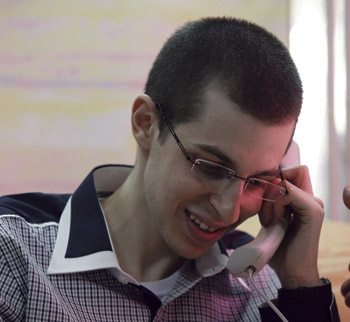It can be hard sometimes to wrap our arms around the messy, contradictory, miraculous and mundane State of Israel. But it was easy for my family to wrap our arms around the skinny shoulders of Gilad Schalit.
When my kids and I visited Israel a few years ago, we stopped by the protest tent his parents had set up outside the prime minister’s house. Truth be told, it felt like making a shivah call.
We bought T-shirts bearing his solemn face and tied bits of coloured ribbon on our knapsacks. We shook hands with Gilad’s father, and in my halting, stilted Hebrew, I told him that we in the Diaspora hadn’t forgotten his son, that we were praying for his boy.
And we were.
We set a place for Gilad at our seder, a plate and an empty chair at a crowded table, to remember the Jew who wasn’t there, who at the very best, was wasting away in a Hamas-created hell.
My teenage sons, just a few years younger than Gilad, and our guests debated the ethics of trading one soldier for hundreds of terrorists, murderers with blood on their hands, men who would potentially kill innocents again.
“What are they talking politics for?” asked an elderly guest.
“Dad, they’re talking Torah, they’re discussing pidyon shvuyim,” the obligation to ransom captives, explained his daughter.
And then came the amazing day when Gilad emerged from Gaza, not in a coffin like so many other Israeli POWs, but on his own unsteady legs, blinking as he surfaced from the darkness.
It was not surprising then, that I took my kids to hear Gilad speak when he came to Toronto last week.
“You know, Gilad made a lot of mistakes when he was captured. We learned about it at camp,” said my 13-year-old daughter. “But I still think we should go hear him.”
And so last week, we stood with 3,000 other Jews and gave Gilad a heartfelt standing ovation.
But sometimes the emotional punch to the gut comes when you least expect it. For me, it was not hearing Gilad speak.
It was deeply satisfying to see him healthy, worlds away from the pale and emaciated soldier released two years ago.
He looked younger than I expected and ill at ease. He remains an unlikely icon, a man reluctantly thrust into the vortex of politics and publicity. But he was gracious in thanking us for remembering and praying and advocating for him during his captivity. And he persevered, stumbling through his 10-minute speech, much of which sounded as if someone else had written it.
But the emotional kick came from an unexpected quarter, from the bravery of Jason Kimelman, whose sister, Marnie, was killed in an explosion on a Tel Aviv beach 23 years ago.
I had completely forgotten the gut-wrenching local twist to the story – that one of the terrorists accused of murdering the Toronto teenager was included in the ransom for Gilad Schalit.
It was agonizing for Jason and his family to realize that the man who had murdered Marnie would soon be free, but their compassion was boundless.
I felt tears welling up as Jason described the day he learned his sister’s murderer was to be included in the prisoner swap. And how his family, after some reflection, reached into some hidden depth to give their blessing to the deal, to allow Gilad to walk free of blame or guilt.
Marnie’s sunny smile, a girl forever 17, was projected on screens around the synagogue, as her brother spoke. Gilad had volunteered to serve in the IDF, the family reasoned. And if they could help bring him home, they would.
In the end, controversies aside, we witnessed some amazing things. We saw a young soldier literally return from the dead. We heard him say he will never forget his five years of captivity, but he will be starting university soon. And we saw a man who suffered a grievous loss give his blessing to that soldier.
It was an evening where we saw that heroism comes in many forms. Not a bad night’s outing.
